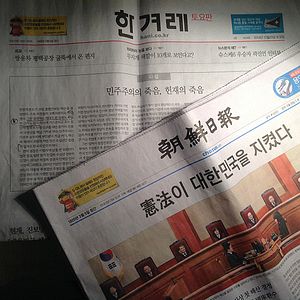Last Thursday, South Korea’s Supreme Court upheld the nine-year prison sentence for Lee Seok-ki, a former assemblyman of the recently disbanded United Progressive Party (UPP). Lee was originally given a 12-year sentence, but it was reduced to nine by the Seoul High Court. The court upheld the verdict that found Lee in violation of the National Security Law for instigating armed rebellion. Notably, it did not find evidence to support the charge that Lee conspired to overthrow the South Korean government by forming a Revolutionary Organization (RO).
The reactions to the Supreme Court ruling by the left-leaning Hankyoreh and the standard-bearer of conservative thought, Chosun Ilbo, are illustrative of the left-right divide on the Lee Seok-ki case and the Constitutional Court’s decision (last December) to disband the UPP.
On the day of the Supreme Court ruling, the Hankyoreh published a column critical of the Supreme Court’s ruling. Two main points of criticism are raised.
The first concerns the standard by which something can be construed as “instigating rebellion.” Hankyoreh argues that the precedent set by the court is dangerous, because the threshold for what constitutes instigating rebellion is far too low. “According to the Supreme Court, there is no need to provide concrete evidence that rebellion is being incited, nor does the probability that the party concerned would actually execute a rebellious act need to be shown,” it writes.
The second point concerns what the Hankyoreh perceives to be contradictory rulings by the Supreme Court and the Constitutional Court. In an 8-1 decision, the latter court issued a ruling effectively dissolving the United Progressive Party on the grounds that its raison d’etre runs contrary to the democratic order in South Korea. But, reasons Hankyoreh, if there is not substantial evidence proving the existence of an RO, how can the dissolution of the UPP be justified? “Despite the Supreme Court not acknowledging the existence of a RO, the Constitutional Court judged the entire party dangerous based on the ambiguous inclination of the party’s leadership,” it reasons.
Chosun’s opinion is significantly different. In a column entitled “For the second time, there is a national consensus to block the influence of Lee Seok-ki and Pro-North forces,” Chosun observes that Lee Seok-ki was not found guilty of conspiring to rebel and agrees with that court that the comments Lee is said to have made at a closed-door meeting with a group of supporters (some think this is the RO) make clear he (and others like him) present a clear and present danger to the security of South Korea. It does not question the Supreme Court’s ruling, unlike Hankyoreh.
Indeed, rather than criticize the Supreme Court or the Constitutional Court’s rulings, Chosun seems to take a subtle shot at South Korean society. “That those who have, over the last 20 years, held fast to the idea of overthrowing the system have made it all the way to the National Assembly is a reality in this country,” it points out. In Chosun’s opinion, it is important to ensure that people like Lee Seok-ki are unable to “strike back.” The latest ruling, in its opinion, seems to ensure just that.
For progressives, both court rulings are indicative of the pitiful state of South Korea’s democracy under (what they consider) the authoritarian rule of Park Geun-hye. Conservatives, on the other hand, see the ruling as a victory against anti-republic forces in the body politic. Both perspectives have merit, but some not insignificant facts about Lee Seok-ki and the UPP are seemingly neglected in the media and by the courts themselves.
First, it is important to remember that Lee Seok-ki came to power (as an assemblyman) via dubious and probably illegal means. As Christopher Green notes in an article about the issue, the UPP only recently took a turn away from the mainstream when more moderate elements were physically prevented (literally) from purging the UPP of its more radical elements (e.g., Lee Seok-ki).
Second, there is certainly no small truth in the opinion that the UPP is more than Lee Seok-ki or his equally-as-divisive colleague, former UPP chairwoman Lee Jung-hee. It is also worth pointing out that Lee Seok-ki was not directly elected. He came to power via proportional representation. So, one might say to Chosun: yes, the people voted for the UPP, but they did not vote for Lee.
Was the UPP ridden with electoral fraud and composed of lawmakers with pro-North Korea political beliefs? Almost certainly. Did it deserve to be dissolved? Arguably, but not necessarily for the reasons being cited. All of this is to say that both sides, on the left and to the right, are worth considering (and critiquing).
All quotes are translations by the author.

































